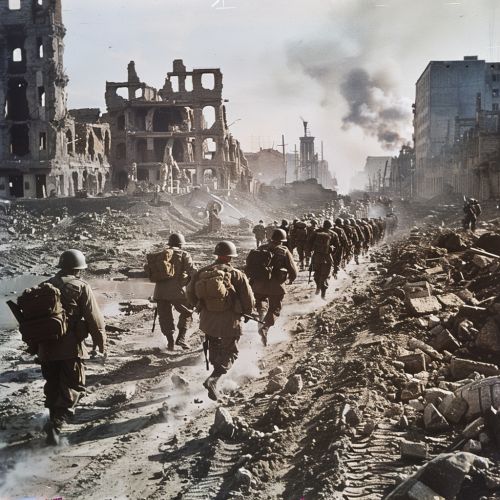Vasily Chuikov: Difference between revisions
(Created page with "== Early Life and Military Career == Vasily Ivanovich Chuikov was born on February 12, 1900, in the village of Serebryanye Prudy, Tula Governorate, Russian Empire. He was the eighth child in a peasant family. Chuikov's early life was marked by hardship and poverty, which influenced his later determination and resilience. At the age of 12, he left home to work in a factory in Petrograd, where he became involved in the revolutionary movement. Chuikov joined the Red Army...") |
No edit summary |
||
| Line 19: | Line 19: | ||
Chuikov implemented a strategy of "hugging" the enemy, keeping his forces as close to the Germans as possible to nullify their artillery and air support. This tactic, combined with the fierce determination of his troops, helped to turn the tide of the battle. The victory at Stalingrad was a turning point in the war and marked the beginning of the Soviet Union's advance towards Berlin. | Chuikov implemented a strategy of "hugging" the enemy, keeping his forces as close to the Germans as possible to nullify their artillery and air support. This tactic, combined with the fierce determination of his troops, helped to turn the tide of the battle. The victory at Stalingrad was a turning point in the war and marked the beginning of the Soviet Union's advance towards Berlin. | ||
[[Image:Detail-79319.jpg|thumb|center|Ruins of Stalingrad with Soviet soldiers advancing.]] | |||
=== Post-Stalingrad Operations === | === Post-Stalingrad Operations === | ||
Revision as of 02:05, 18 May 2024
Early Life and Military Career
Vasily Ivanovich Chuikov was born on February 12, 1900, in the village of Serebryanye Prudy, Tula Governorate, Russian Empire. He was the eighth child in a peasant family. Chuikov's early life was marked by hardship and poverty, which influenced his later determination and resilience. At the age of 12, he left home to work in a factory in Petrograd, where he became involved in the revolutionary movement.
Chuikov joined the Red Army in 1918 during the Russian Civil War. He quickly rose through the ranks due to his leadership skills and bravery. By 1920, he was commanding a regiment. His early military career was characterized by his participation in various significant battles, including the defense of Tsaritsyn (later known as Stalingrad).
Interwar Period
During the interwar period, Chuikov continued to advance his military education and career. He attended the Frunze Military Academy, graduating in 1925. He then served in various command and staff positions, gaining valuable experience. In the late 1920s and early 1930s, Chuikov was involved in the suppression of the Basmachi movement in Central Asia, which further honed his counter-insurgency skills.
In 1936, Chuikov was sent to China as a military advisor to the Nationalist government during the Second Sino-Japanese War. His experiences in China were crucial in shaping his understanding of guerrilla warfare and urban combat, which would later prove invaluable during the Battle of Stalingrad.
World War II
Battle of Stalingrad
Chuikov is perhaps best known for his role in the Battle of Stalingrad, one of the most pivotal battles of World War II. In September 1942, Chuikov was appointed commander of the 62nd Army, tasked with defending the city of Stalingrad against the advancing German 6th Army. His leadership during this brutal and protracted battle was instrumental in the Soviet victory.
Chuikov implemented a strategy of "hugging" the enemy, keeping his forces as close to the Germans as possible to nullify their artillery and air support. This tactic, combined with the fierce determination of his troops, helped to turn the tide of the battle. The victory at Stalingrad was a turning point in the war and marked the beginning of the Soviet Union's advance towards Berlin.

Post-Stalingrad Operations
Following the victory at Stalingrad, Chuikov continued to play a significant role in the Red Army's operations. He commanded the 8th Guards Army, leading it through the liberation of Ukraine, the capture of Warsaw, and the final assault on Berlin. His ability to adapt to different combat situations and his relentless pursuit of victory earned him a reputation as one of the Soviet Union's most effective commanders.
Post-War Career
After World War II, Chuikov held several high-ranking positions within the Soviet military and government. He served as the commander of the Soviet occupation forces in Germany and later as the commander of the Kiev Military District. In 1955, he was promoted to Marshal of the Soviet Union, one of the highest military ranks.
Chuikov also played a role in the development of Soviet military doctrine during the Cold War. He was an advocate for the modernization of the Soviet armed forces and the integration of new technologies and tactics. His contributions to military theory and practice were recognized both within the Soviet Union and internationally.
Legacy
Vasily Chuikov's legacy is closely tied to his leadership during the Battle of Stalingrad, but his impact on military strategy and tactics extends beyond this single battle. His emphasis on close-quarters combat, urban warfare, and the psychological aspects of warfare influenced both Soviet and global military thinking.
Chuikov was awarded numerous honors and decorations throughout his career, including the title of Hero of the Soviet Union, the Order of Lenin, and the Order of Victory. He passed away on March 18, 1982, and was buried at the Mamayev Kurgan memorial complex in Volgograd, a fitting tribute to his role in one of the most significant battles of World War II.
